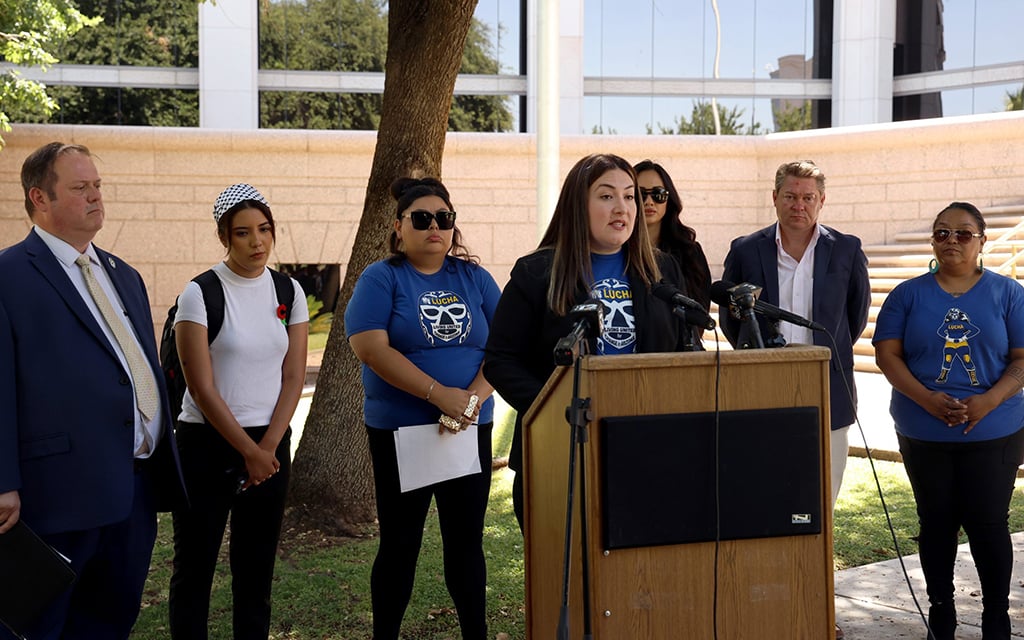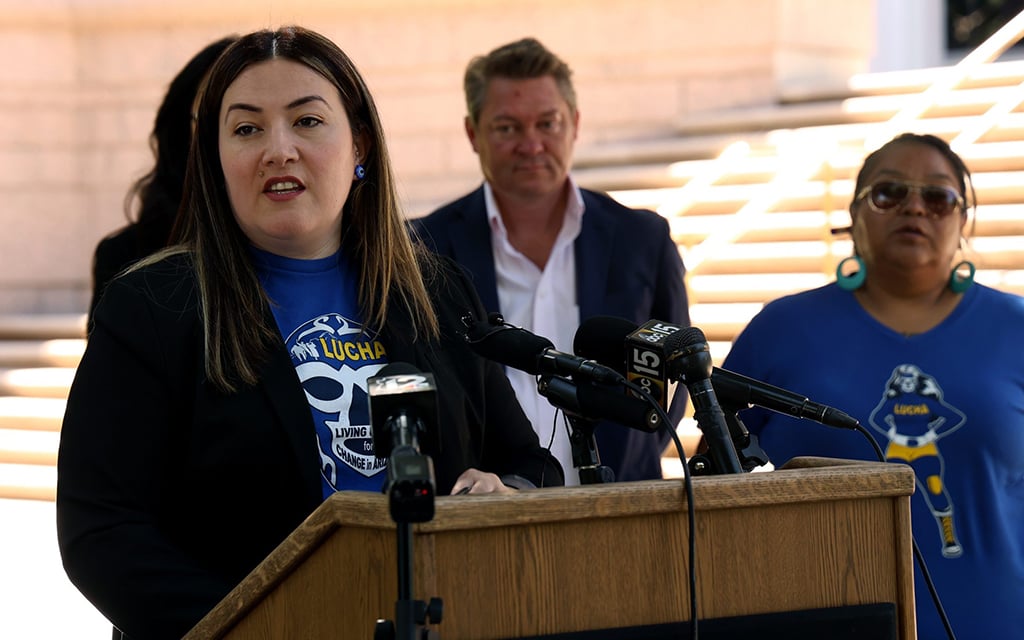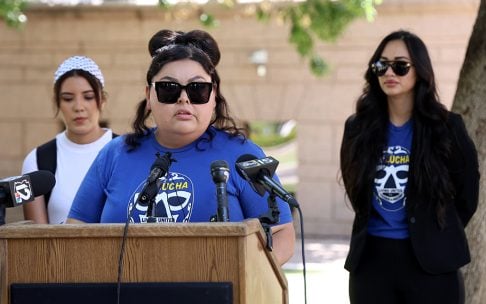WASHINGTON – Proposition 314 would make it a crime under Arizona law to cross the border illegally – allowing police to arrest anyone who can’t prove U.S. citizenship or legal residency and state courts to order deportations.
Even if voters approve the measure in November, it faces high legal hurdles.
Immigration enforcement is a federal power, and federal courts have so far blocked similar laws in Texas and other states. Advocates for civil liberties and migrants warn that such “show me your papers” laws put Americans with darker skin and accents at risk.
“It’s completely unconstitutional under every interpretation of the Constitution by the federal courts to date,” said Lynn Marcus, a clinical immigration law professor at the University of Arizona.
A similar Arizona law from 2010 known as SB 1070 triggered nationwide backlash and boycotts, amid allegations it would lead to racial profiling.
The U.S. Supreme Court struck down most of that law in 2012 in Arizona vs. United States. The ruling reiterated a basic principle of federalism: “States are precluded from regulating conduct in a field that Congress has determined must be regulated by its exclusive governance.”
One key element of SB 1070 survived – a provision requiring police to demand papers of anyone suspected of being in the country illegally. Arizona ended that practice in 2016, though, as part of a settlement with immigrant rights groups.
“Proposition 314 will open up Arizona to a ton of different lawsuits,” said César Fierros, spokesman for Living for United Change, or LUCHA, an immigrant advocacy group. “It’s going to cost taxpayers a lot of money.”
In March, Gov. Katie Hobbs vetoed a bill that, like Proposition 314, would have made it a crime under state law to be in the United States illegally.
To bypass her, Republicans in the Legislature shifted tactics. A measure known as HCR 2060 would let voters decide.
The House approved it 31-29. The Senate vote was 16-13. No Democrats supported it.
“Arizona has an interest in the regularization of traffic across its border, even though it’s a federal responsibility to ensure that those borders are properly controlled,” said Daniel Stein, president of the Federation for American Immigration Reform, which seeks immigration restrictions.
Taking the legal challenges into account, Proposition 314 would only take effect once the Texas law or any similar law in another state has been in effect for 60 days.
Arizona police already have the authority to assist Border Patrol in the arrest of illegal immigrants.
The legal rationale for Proposition 314 – and SB 4 in Texas – is that the influx of immigrants coming across the U.S.-Mexico border amounts to an “invasion.” Under Article 1, Section 10 of the U.S. Constitution, states may “engage in war” if “actually invaded or in such imminent Danger as will not admit of delay.”
In early 2022, Arizona’s previous attorney general, Mark Brnovich, a Republican, issued an opinion advising the Legislature that “invasion” as a constitutional concept “is not limited to hostile foreign states. … The violence and lawlessness at the border caused by transnational cartels and gangs satisfies the definition … and Arizona therefore has the power to defend itself from this invasion.”
But courts have yet to agree that drug smugglers and unarmed migrants – as opposed to a foreign army – could trigger that clause.
Texas Gov. Greg Abbott, a Republican, signed the law in December and has argued repeatedly that the state is under invasion.
The U.S. Justice Department has challenged the Texas law, and it is not currently in force.
Noah Schramm, border policy strategist at ACLU of Arizona, said he expects a Trump administration – if former President Donald Trump wins in November – would not try to stop Arizona, Texas and other states from taking a role in immigration enforcement.
That, he said, would be a “more challenging landscape” for his side of the issue.
In February, U.S. District Court Judge David Alan Ezra, a Reagan appointee sitting in the Western District of Texas, rejected Abbott’s argument, ruling that “invasion” refers exclusively to an attack by a hostile foreign government.

Alejandra Gomez, executive director of Living United for Change in Arizona (LUCHA), speaks out about Proposition 314. “While Republicans believe this will rally their base, I can assure you that a different story will be told on the day after the election,” she said at a news conference in front of the Arizona Supreme Court building in Phoenix on June 5, 2024. (File photo by Stella Subasic/Cronkite News)
The conservative Fifth U.S. Circuit Court of Appeals overturned the judge’s injunction, allowing enforcement to proceed as challenges work through the courts. On March 19, the U.S. Supreme Court voted 6-3 to uphold the appellate ruling, clearing the way for enforcement.
But based on the highest court’s critique of its reasoning, the Fifth Circuit pivoted. Within hours it reinstated the injunction, rendering SB 4 unenforceable until courts sort out the issue of constitutionality.
“The entry, admission, and removal of noncitizens … is exclusively a federal power” and has been recognized as such for 150 years, wrote Chief Judge Priscilla Richman of the Fifth Circuit.
The ruling drew on the Supreme Court opinion that dismantled Arizona’s SB 1070 in 2012.
“It would be very shocking for them (the courts) to shift position because the legal issues are identical,” said David Donatti, a senior staff attorney at ACLU of Texas.
In May, the Justice Department sued Iowa to block a similar law allowing arrest and deportation of people in the country illegally. In late June, a federal judge temporarily blocked enforcement of a new law in Oklahoma that also allows such arrests.
One wrinkle with Proposition 314 involves the state constitution’s “single-subject rule.” That requires each bill to focus on one subject.
Along with empowering arrests of suspected immigrants, Proposition 314 would also crack down on the sale of fentanyl and toughen penalties for using false documents to apply for public benefits or to pass an employment eligibility check.
Maricopa County Superior Court Judge Scott Minder rejected a challenge from LUCHA last week, declaring that Proposition 314’s multiple provisions fell under the umbrella of “deterrents to, or enforcement methods for, crossing the border without legal permission.”
LUCHA has taken the argument to the Arizona Supreme Court.
The Arizona Secretary of State has warned the issue must be resolved before Aug. 22 so ballots can be printed.



